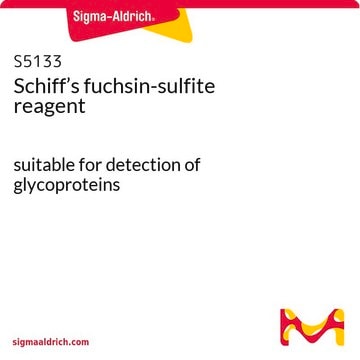About This Item
Recommended Products
Quality Level
product line
ReagentPlus®
Assay
≥99.0%
form
powder or crystals
reaction suitability
reagent type: oxidant
technique(s)
toxicology assay: suitable
mp
122 °C (lit.)
solubility
water: 100 mg/mL, clear, colorless
SMILES string
OI(O)(O)(O)(O)=O
InChI
1S/H5IO6/c2-1(3,4,5,6)7/h(H5,2,3,4,5,6,7)
InChI key
TWLXDPFBEPBAQB-UHFFFAOYSA-N
Looking for similar products? Visit Product Comparison Guide
General description
Application
- Oxidation of alcohols to ketones and aldehydes.
- Oxidation hydroxylamine derivatives.
- Oxidation of arenes to quinones.
It can also be used:
- As a stoichiometric oxidant with chromium (IV) acetate for the oxidation of tertiary C−H bonds to tertiary alcohols.
- In combination with chromium oxide to oxidize primary alcohols to carboxylic acids; alkylbenzenes to benzoic acids; and cyclic benzyl ethers to the corresponding lactones.
- In the selective oxidation of sulfides to sulfoxides using FeCl3 as a catalyst.
Legal Information
Signal Word
Danger
Hazard Statements
Precautionary Statements
Hazard Classifications
Aquatic Acute 1 - Aquatic Chronic 1 - Eye Dam. 1 - Ox. Sol. 1 - Skin Corr. 1B - STOT RE 1 Oral
Target Organs
Thyroid
Storage Class Code
5.1A - Strongly oxidizing hazardous materials
WGK
WGK 3
Flash Point(F)
Not applicable
Flash Point(C)
Not applicable
Regulatory Listings
Regulatory Listings are mainly provided for chemical products. Only limited information can be provided here for non-chemical products. No entry means none of the components are listed. It is the user’s obligation to ensure the safe and legal use of the product.
FSL
Group 1: Oxidizing solids
Periodic acid
Hazardous rank I
1st oxidizing solid
ISHL Indicated Name
Substances Subject to be Indicated Names
ISHL Notified Names
Substances Subject to be Notified Names
JAN Code
P7875-VAR:
P7875-500G:4548173991467
P7875-25G:4548173991450
P7875-BULK:
P7875-100G:4548173991474
P7875-H:
Certificates of Analysis (COA)
Search for Certificates of Analysis (COA) by entering the products Lot/Batch Number. Lot and Batch Numbers can be found on a product’s label following the words ‘Lot’ or ‘Batch’.
Already Own This Product?
Find documentation for the products that you have recently purchased in the Document Library.
Customers Also Viewed
Our team of scientists has experience in all areas of research including Life Science, Material Science, Chemical Synthesis, Chromatography, Analytical and many others.
Contact Technical Service











